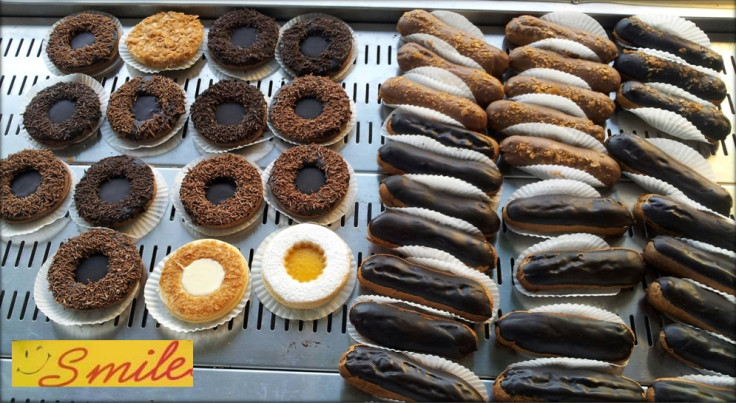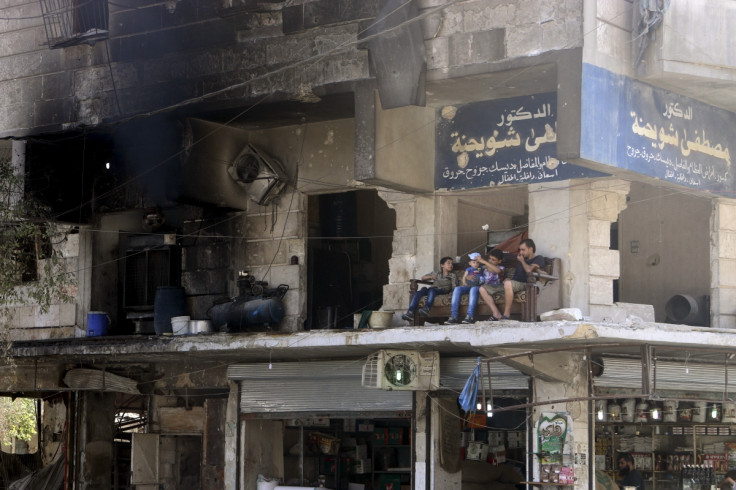Syria's Smile cafe: How birthday cakes and pizza are helping keep Aleppo sane during civil war

Although many people will tell you that they cannot live without cake, they're usually lying. IN times of need, we will sacrifice the cake. But when your life is a daily mix of dread and fear, learning to live normally can become a survival mechanism. In Aleppo, one of the cities worst affected by fighting and bombing during the Syrian civil war, it might come as a surprise that there's still demand for cake.
Of the 19 restaurants in Aleppo on TripAdvisor, there aren't many without comments saying "long gone". One survivor is been the happily named Smile Cafe. Smile started in April 2013, by the Labbad family. George Labbad told IBTimes UK that they set up the cafe after the family's restaurant was destroyed, as they needed "to keep going, keep functioning".
"It started basically from nothing, just gathering all the contacts we knew, what could we do? We got the place and were like: 'OK.'"
George and his family have a long history in hospitality. They had owned the Gondole restaurant in Aleppo since 1960. Gondole could seat 900 people and was part of a larger complex called Lazord. They stopped being able to reach the area in late summer 2012. They later heard the main building had been destroyed and was held by various groups.
Smile is in a relatively safe part of the city. There have been issues in the area, a few bombs down the road, but the cafe has stayed unscathed. Rather than suffering the explosive problems of war, Smile is dealing with more business-like issues – where do we get the next supply of flour? What do we do when our employees keep fleeing the country?
Smile started with the idea that they would provide basics for the community. "Pastries are essential," says George, "this is the type of culture we're coming from." The plan was to bake bread and do a few extra pastries that people could buy on the way. "We decided to set our prices close to cost... we didn't want to function on a huge profit margin. We wanted to go down the route of – it's something for everyone, everyone can afford it."

It would make sense that people in a city in the middle of civil war would only be looking to gather the basics to survive, but that wasn't all the Labbads found. There was another demand they hadn't originally accounted for – people wanted cakes.
"You still do weddings, you still do birthday parties, first communion, things like that, people are still having those kinds of occasions because they are so important to the culture that we still have to do that." In amongst the war, people still wanted to hold onto important parts of their culture, birthdays were still a celebration, "the kid still has to have his cake".
When cakes did well, they started to make food for functions. Things were going so well, they decided to expand. Smile is in a three-storey building, on the top floor they had a simple seating area. It was mid-2013, and the last of the World Cup qualifiers were under way. Smile turned the top floor into a place to watch the games. There were just two problems – electricity and TV channels.
The electricity supply was intermittent, most people were using personal generators powered by diesel, but the price was going up. International TV packages were expensive too. The most basic supplies that a bakery needs to function – flour, sugar, water – were all become harder to find and more and more expensive. Prices were adding up to the point that Smile's price points were lower than their costs. The cafe had to start incrementally increasing how much they sold pastries for.
"We were still hoping that [the prices were] going to come back to the original cost but at some stage we were like 'OK, these prices will never go down again'... we went ahead and started slightly increasing our prices."

"You have to pace all these issues because the situation is not stable. There is no consistency with your suppliers – some suppliers left, some workers left, our main chef went to another city... Some people decided to move on, we kept going."
The next stage was to expand into the local area. They found that there were a number of cafes around them where people would hang out but that didn't produce food. They started to offer themselves as pizza delivery guys. You order a pizza in the cafe, they call Smile and Smile delivers the pizza in about 20 minutes, everyone gets a share of the profits. "You have a cafe, you just have a few sofas, a TV, a shisha bar, but you don't have food? If you want to come take food from someone, we'll look after you and we'll share the profits." Smile now works as the kitchen for around 10 smaller cafes. It's become a way to share the wealth through the neighbourhood.
As well as the cafe was doing, it never took away from the fact that Smile was trying to stay afloat in the middle of a war. "It's hard to imagine the situation because when you're there you're under threat all the time. You leave your house, you don't when you're coming back, you don't know if you're coming back."
"At the end of the day, people are trying their best. I think most people are ignoring the war, which is hard to do, but what they're trying to say is 'tomorrow is a better day, tomorrow is a better day, the next hour is a better hour.'"
When IBTimes UK spoke to George he was in Dublin, he had gone to university in the city and was back for a while to see what opportunities were around. His family is still in Aleppo, working in Smile alongside 12 employees. They try to stay attached to employees and suppliers, to build up working relationships, but the situation rarely permits it. Employees flee the country, suppliers and supplies disappear.
But George says you can still find the 'Aleppo arrogance' – people coming in demanding that their children get the best birthday cakes with all kinds of pictures and cartoons on. Smile caters for them all.
It seems that amongst all the instability – even the instability of war – there is one thing for certain, wherever you are, there will always be demand for cake.
© Copyright IBTimes 2025. All rights reserved.






















